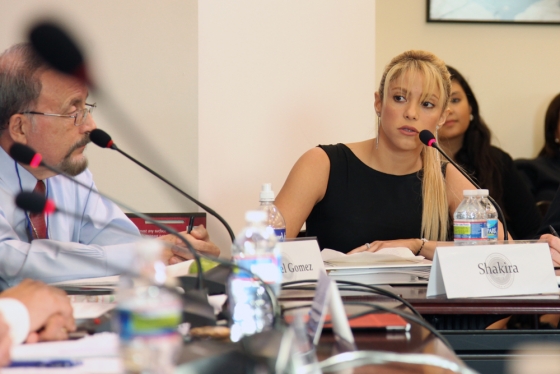-
In his press conference today, the President spoke primarily about what we can do to create jobs and boost the economy right now, but he also took some time to discuss his efforts to fix the problems in our financial sector that precipitated this economic downturn:
And what we’ve seen over the last year is not only did the financial sector -- with the Republican Party in Congress -- fight us every inch of the way, but now you’ve got these same folks suggesting that we should roll back all those reforms and go back to the way it was before the crisis.
As he also explained, his nominee to be the first head of the Consumer Financial Protection Bureau, former Ohio Treasurer and Attorney General Rich Cordray, is being blocked from office, noting that “Republicans have threatened not to confirm him not because of anything he’s done, but because they want to roll back the whole notion of having a consumer watchdog.”
Not surprisingly, those Republicans in Congress have looked for any excuse to avoid admitting that they are seeking to weaken these consumer protections – here are the facts behind their attacks on this important new watchdog for consumers:
-
October 06, 2011
03:48 PM EDTEd. Note: Champions of Change is a weekly initiative to highlight Americans who are making an impact in their communities and helping our country rise to meet the many challenges of the 21st century.
To kick off Breast Cancer Awareness Month, last week leaders in the fight to end breast cancer participated in a roundtable discussion at the White House. The leaders included activists, scientists and health care providers who are making a difference in this fight every day. The discussion was led by Chief of Staff to the First Lady and Executive Director of the Council on Women and Girls, Tina Tchen, and it focused on the progress and challenges in the fight to end this devastating disease.
The fight against breast cancer is a personal issue for me. I learned the importance of this issue from my late mother Pat Barr, who first brought me along organizing with her when I was 10 years old. Back in the early 90’s, I trekked all over my little town of Bennington, VT collecting petitions for the National Breast Cancer Coalition’s 300 Million More campaign supporting more breast cancer research funding.
-
October 06, 2011
03:00 PM EDTLatino youth are the fastest-growing group in America, and more Latino children are living in poverty than children of any other racial or ethnic group; one in four, that's 6.1 million Latino children living in poverty in the United States.
For a host of reasons, young Latinos in this country disproportionately drop out of school and far too few finish college. And as I have seen in my own philanthropic work, the only road out of poverty is education.
Investing in the educational achievement of this vulnerable population will not only help determine the economic future and competitiveness of this nation, but can serve as a model for the world. I am grateful to have an opportunity to support and inform such important work.
I hope that through my appointment to this commission, I will be able to share what I've learned through the 15 years I have been involved in the education of Latino children. As we all know, race and ethnicity shouldn't be factors in the success of any child.
It is my belief that if we provide early childhood education to Latino children who need it but cannot afford it, it will take less than a decade to reap the benefits. There will be fewer Latino students being held back, fewer who need special education at a later age, less crime involving school-age children, and a smaller achievement gap between Latino and White students.
-
Watch First Lady Michelle Obama and Second Lady Dr. Jill Biden announce the Joining Forces Community Challenge, here.
The First Lady and I are excited to announce that the submission deadline for the Joining Forces Community Challenge has been extended to October 31, 2011.
In a previous post, we highlighted a sample of the submissions and nominations that we have already received. Since that post, we have been amazed by the flood of applications featuring people around the country that are working to support our military families. Whether as an individual, a small regional organization, or a nation-wide effort, you continue to be an inspiration to us all.
-
October 06, 2011
12:21 PM EDTEd. Note: Cross posted with the Department of Justice Blog.
Yesterday, along with COPS Director Barney Melekian, I traveled to Cincinnati, Ohio, to discuss the Justice Department’s most recent efforts to support our nation’s law enforcement community – and to ensure that police officers from coast to coast have the resources that they need and deserve.
In recent years, police departments like Cincinnati’s – and law enforcement agencies nationwide – have faced extraordinary budget difficulties and have been asked to do more with less. All across the country, law enforcement officials have risen to the challenge – and found innovative, collaborative ways to improve public safety and to keep crime trends heading in the right direction. But at a time when approximately 10,000 officer jobs have been cut, and three times as many positions are currently unfilled due to fiscal constraints, we have a looming national crisis on our hands, both in terms of public safety and public employment. In short, our citizens need protection – and our police officers and other first responders need jobs.
As part of the Department’s ongoing effort to meet these needs, I’m proud to report that the COPS Office is providing more than $240 million in new grants to support the hiring and retention of more than 1,000 officers in nearly 240 agencies and municipalities across the country. The Cincinnati Police Department alone was awarded more than $6.8 million in grant money from the COPS Hiring Program, which will fund 25 critical positions for three years.
-
President Obama met with President Porfiro Lobo of Honduras yesterday in the Oval Office to reaffirm the strong relationship between the United States and Honduras. Before the bilateral meeting, President Obama spoke of President Lobo's role in restoring democratic practices following a coup in Honduras two years ago and the chance to expand economic opportunities between our countries:
-
October 06, 2011
10:24 AM EDTToday, the White House Initiative for Educational Excellence for Hispanics will host its second commission meeting here at the White House. The Commission is tasked with expanding academic excellence and improving educational opportunities for Hispanics by providing advice to President Obama and Education Secretary Arne Duncan. Hispanics are already the largest minority group in the public education system with more than 1 in 5 students in the nation’s elementary, middle and high schools, but have the lowest education attainment level overall, according to a report by the White House Initiative on Educational Excellence for Hispanics.
Dr. Jill Biden, a lifelong educator and wife of Vice President Joe Biden, will join the meeting today to give brief remarks on the importance of Hispanic success in education to America’s economy. In addition, world famous singer, songwriter and record producer Shakira will join the meeting as a newly appointed commissioner. Shakira has worked on a number of efforts to expand and improve comprehensive early childhood care and education around the world. She joins a stellar group of other education and civic leaders who are Members of the Commission for the White House Initiative for Educational Excellence for Hispanics.
-
A little over a year ago, the President overcame the fierce lobbying of the financial industry and Republican obstruction and signed into law Wall Street Reform, which included the strongest consumer protections in history, critical reforms to rein in Wall Street and protections against another financial crisis. But as he said at the time, the promise of this legislation would only be realized if we implemented the law in a way that truly reformed our financial system, making sure that banks are competing based on the service they provide to consumers, not on the hidden fees they can charge or the non-transparent practices they can get away with.
Today, the Senate Banking Committee will take a vote that is critical to implementing this law so that it fully protects consumers from hidden fees and abusive practices: the committee is scheduled to vote on the nomination of Richard Cordray to become the Director of the Consumer Financial Protection Bureau (CFPB). The CFPB was created as part of Wall Street reform to enforce consumer protections.
Today’s vote, and the subsequent vote by the full Senate to confirm Richard Cordray, is so important because without a director the CFPB is hamstrung in its ability to protect consumers. Without a director, the CFPB will be unable to ensure that banks, debt collectors, private student loan providers and payday loan providers are properly supervised and that consumers are not put at risk of falling prey to the same kinds of abusive practices that helped cause the worst financial crisis since the Great Depression.
-
Following the loss of visionary Apple co-founder Steve Jobs, President Obama released this statement:
Michelle and I are saddened to learn of the passing of Steve Jobs. Steve was among the greatest of American innovators - brave enough to think differently, bold enough to believe he could change the world, and talented enough to do it.
By building one of the planet’s most successful companies from his garage, he exemplified the spirit of American ingenuity. By making computers personal and putting the internet in our pockets, he made the information revolution not only accessible, but intuitive and fun. And by turning his talents to storytelling, he has brought joy to millions of children and grownups alike. Steve was fond of saying that he lived every day like it was his last. Because he did, he transformed our lives, redefined entire industries, and achieved one of the rarest feats in human history: he changed the way each of us sees the world.
The world has lost a visionary. And there may be no greater tribute to Steve’s success than the fact that much of the world learned of his passing on a device he invented. Michelle and I send our thoughts and prayers to Steve’s wife Laurene, his family, and all those who loved him.
-
Today, First Lady Michelle Obama was joined by a big group of helpers for the third annual White House kitchen garden fall harvest. Students from Bancroft and Tubman Elementary Schools got their hands dirty picking produce from the garden and then had a chance to try some of the vegetables that they picked on grilled garden pizza.
White House Executive Chef Cristeta Comerford shared the recipe for grilled garden pizza:
-
October 05, 2011
01:15 PM EDTEd. Note: Cross-posted from the Office of Wounded Warrior Care and Transitional Policy blog.
Last week the Department of Defense released a statement reminding Service members and Veterans that the deadline for Retroactive Stop Loss Payments (RSLP) is fast approaching. This is not an automatic entitlement, benefit or allowance. Eligible Service members and Veterans must file a claim by October 21, 2011 to receive this benefit.
The 2009 War Supplemental Appropriations Act authorizes Retroactive Stop Loss Special Pay of $500 per month for each month or any portion of a month during the period specified that the current or former Soldier, Marine, Sailor, and Airman was retained on active duty as a result of of Stop Loss. The act applies to service members Stop Lossed during the period starting 11 September 2001 and ending 30 September 2009.
-
October 05, 2011
12:09 PM EDTOn the interstate, when traffic suddenly slows, often you come across the obvious cause of the jam: a fender bender, construction, a breakdown. But in trying to understand why the country’s pharmaceutical, biotech and medical device sectors seem to be facing a slowdown in terms of innovation, there is no single cause.
It’s likely that this slowdown is due to a combination of many factors. And while these industries have fared better than others, it is critical for the health and well being of every American that they not just survive, but thrive.
That’s why we want the Food and Drug Administration (FDA) to do everything we can to promote innovation.
Today the FDA is an agency that works with industry to ensure that a wide array of products that improve the lives of millions of Americans are safe and effective. We do that well, and I am personally proud of that.
But we have also been listening closely to companies, patients, doctors and advocacy groups about ways we can help America remain the leader in biomedical innovation. The FDA’s suggestion box is never closed. And, as you can imagine, never empty.
-
Ed. Note: Cross-posted from Fast Lane, the blog of the Secretary of Transportation.
Earlier this week, President Obama called on Congress to recognize the needs of unemployed Americans by taking up the American Jobs Act this month.
I was reminded of my trip to St. Paul, MN, where I saw the progress being made on the Central Corridor Light Rail Line, which will connect St. Paul and Minneapolis. That project is expected to create 3,300 jobs – and that doesn’t even include the local businesses that will benefit from being located near the line’s 18 new stations.
We're talking about American transportation, built by American workers, and strengthening an American city. It can and should be a model for the rest of the country. And that's why I'm so excited about the American Jobs Act.
-
The White House today released a report that outlines the devastating impact the recession has had on schools and students across the country. Teacher Jobs at Risk highlights the significant cuts in education spending that have resulted from state budget shortfalls since 2008, including the loss of nearly 300,000 teaching jobs across the country (see chart below).
And in the coming school year, without additional support, many school districts will have to make another round of difficult decisions. As a result of state and local funding cuts, as many as 280,000 teacher jobs could be at risk. Unless they receive federal assistance, many school districts will be forced to reduce the number of teachers in their classrooms, or turn to other measures such as shortening the school year or cutting spending on schoolbooks and supplies.
President Obama, speaking today in Texas, compared the situation here with South Korea, where their President said they can’t hire teachers fast enough:
“They call them “nation builders” -- that’s what they call teachers in Korea, “nation builders,” because they know that educating their children is the best way to make sure their economy is growing, make sure that good jobs are locating there, making sure they’ve got the scientists and the engineers and the technicians who can build things and ship them all around the world. That’s what he understands. And the whole country supports him. Here in America, we’re laying off teachers in droves. It makes no sense. It has to stop. It has to stop.”
The President was at Eastfield Community College, in Mesquite, Texas where he toured a pre-school before talking about the impact the American Jobs Act will have on schools, and on teachers, across the country. He told the crowd there that the stakes for addressing this situation are high, with “nothing less than our ability to compete in this 21st century economy” at risk.
This is why one of the central components of the American Jobs Act, which the President introduced last month at a Joint Session of Congress, is funding to avoid and reverse teacher layoffs now, and to provide support for the re-hiring and hiring of educators.
Specifically, the American Jobs Act will invest $30 billion to support state and local efforts to retain, rehire, and hire early childhood, elementary, and secondary educators. If enacted, these teacher stabilization funds would help prevent layoffs and support the hiring or re-hiring of nearly 400,000 educators, includ¬ing teachers, guidance counselors, classroom assistants, afterschool personnel, tutors, and literacy and math coaches. These funds will ensure that schools are able to keep teachers in the classroom, preserve or extend the regular school day and school year, and maintain important afterschool activities.
-
Every day, President Obama is fighting to put more Americans back to work. That’s why he proposed the American Jobs Act – a package of bipartisan, common sense measures designed to help U.S. businesses grow and create jobs – which Congress should pass right away.
Yesterday, the President took another step to help create and preserve U.S. jobs when he sent Congress three trade agreements,with Korea, Colombia, and Panama. President Obama is calling on Congress to pass the trade agreements and at the same time to renew Trade Adjustment Assistance (TAA) that helps workers whose jobs are affected by global competition. All four of these items are important elements of the President’s balanced trade agenda to open markets for U.S. exporters and keep faith with workers here at home.
Together, these agreements are estimated to increase U.S. GDP by more than $12 billion and support tens of thousands of additional American jobs. In fact, it is estimated that every $1 billion of goods and services we export supports approximately 5,500 jobs at home. That means the Korea trade agreement will support at least an estimated 70,000 U.S. jobs through increased goods exports alone.
Naturally, the big job-building potential of these agreements has led many Americans to ask how increased trade translates into more U.S. jobs. The short answer is that trade agreements open overseas markets to significantly enhance opportunities for American businesses and workers to sell more innovative, high-quality products Made in America to customers all around the world. And as American exporters expand their businesses by increasing international sales into these newly-opened markets, they are likely to hire more workers to produce goods and provide services here at home.
These agreements will make it cheaper, faster, and easier for U.S. producers to sell more American goods and services in the growing markets of Korea, Colombia and Panama. They will put American businesses, workers, farmers, ranchers, manufacturers and service providers on a level playing field against foreign competitors.
For example, today, there are plenty of Hyundais and Kias on American highways, because car customers here in the United States have the freedom to choose among many different brands and models at competitive prices. In contrast, there aren’t nearly as many Fords, Chevys, or Chryslers cruising the streets of Korea, in part because high tariff and non-tariff barriers currently put U.S. auto manufacturers at a disadvantage in the South Korean market.
Seizing sales opportunities overseas can build jobs and businesses of all sizes throughout the American automotive supply chain here at home. That’s why, last year, President Obama sent a team back to the negotiating table to secure additional market access and a level playing field for U.S. auto manufacturers in Korea. Now there are more export opportunities – and more potential jobs – on the table in the U.S.-Korea trade agreement. Similarly, the Colombia and Panama trade agreements will enhance job-building export opportunities for U.S. producers.
President Obama wants to turn these trade opportunities into real jobs and more money for American working families. Now’s it’s up to Congress to act by passing the trade agreements and renewing TAA. By coming together to find common ground on a balanced approach to trade, we can get our economy moving full speed ahead with more jobs for hard-working Americans.
-
Destiny Wheeler wants Congress to pass the American Jobs Act now. The 16-year-old wrote to President Obama last month, and explained that the rough economy was making it “hard to see myself pushing forward and putting my family in a better position.”
The President was moved by the Georgia high school junior’s plea, and referenced her letter in his October 1 weekly address. In it, Destiny wrote about her fears that despite her hard work, the caliber of her education will seem “trivial” compared to her peers in other countries. “The American Jobs Act,” she wrote “gives me hope that I might start to receive a better education, that one day job opportunities will be open for me to grasp and that one day my personal American Dream will be reached.”
In a follow-up conversation, Destiny said it wasn’t just concern for her own future that compelled her to write to the President for the first time, but the Jobs Acts’ emphasis on modernizing schools across the country. “I am mostly focused on what I see in other schools. In some schools there will be tons of students and only 3 computers and one of them doesn’t even work. You modernize schools and you help kids move forward.” Her own school, Destiny said, does have enough computers for students to use in class.
President Obama is well aware of the negative effects the economy is having on our students. “Here in America, we are laying off teachers in droves. It makes no sense, and it has to stop,” President Obama said today in Texas. “Congress should pass this jobs bill so we can put our teachers back in the classroom where they belong.”
America’s education system has always been one of this country’s greatest sources of strength and global economic competitiveness, as well as the engine of incredible progress in science, technology, and the arts. Today’s students will not get the training they need for the high-skilled jobs of today, or for the opportunities of the future, without investments in a world-class education system.
Today, the White House released a report, Teacher Jobs at Risk, outlining how the Administration’s efforts – including the American Jobs Act - will keep teachers in the classroom, strengthen our schools and improve the local economy in communities across the country.The American Jobs Act will support nearly 400,000 education jobs, preventing layoffs of educators and allowing thousands more to be hired or rehired. In addition, the President’s plan will modernize at least 35,000 public school buildings and community college campuses, which is the element of the plan that so appeals to Destiny Wheeler, and is giving her renewed hope for her own future and that of students like her across the country.
"Please Mr, President," she wrote, "continue your support for this BIll, it means so much to me and my family to know there is someone in government looking out for the common citizen."
-
This morning, Chairman Cliff Stearns, who leads the House Energy and Commerce Subcommittee on Oversight and Investigations, told NPR that "We can't compete with China to make solar panels and wind turbines."
This comment reflects exactly the sort of counterproductive defeatism that Energy Secretary Steven Chu warned against this weekend when he spoke to a group of America’s most promising young solar innovators:
“The United States faces a choice today: Will we sit on the sidelines and fall behind or will we play to win the clean energy race? Some say this is a race America can’t win. They’re ready to wave the white flag and declare defeat… Others say this is a race America shouldn’t even be in. They say we can’t afford to invest in clean energy. I say we can’t afford not to.
“It’s not enough for our country to invent clean energy technologies – we have to make them and use them too. Invented in America, made in America, and sold around the world – that’s how we’ll create good jobs and lead in the 21st century.”
The race for clean energy jobs and industries is on – and it is a race well worth winning. The International Energy Agency projects that in the coming decades, solar power could grow to more than 20 percent of the world’s electricity. Conservatively, this means that there is an economic opportunity worth trillions of dollars for whichever countries claim the lead. The global market for wind turbines is also growing exponentially.
But it’s not just the vast potential of jobs tomorrow – these industries employ a growing number of Americans today. In fact, business groups estimate that America’s solar industry accounts for about 100,000 jobs and the wind industry employs 75,000. Should we simply tell those workers that we’ve given up on them?
A study released last month showed that, in spite of the intense global competition, the U.S. remains a net global exporter of solar technology – with $5.6 billion in exports and an overall positive trade balance of $1.8 billion.
It is certainly true that China is playing to win. Last year alone, China offered its solar manufacturers $30 billion in government financing, vastly exceeding the U.S. investment. And China has overtaken the United States market share in solar power – a technology we invented.
Chairman Stearns and other members of his party in Congress believe that America cannot, or should not, try to compete for jobs in a cutting edge and rapidly growing industry. We simply disagree: the answer to this challenge is not to wave the white flag and give up on American workers. America has never declared defeat after a single setback – and we shouldn’t start now.
America’s entrepreneurs and innovators are still the very best in the world. Our workers are second to none – and we have never been afraid of a challenge. It’s time to do what we’ve always done in the face of a tough competitor: roll up our sleeves and recapture the lead.
-
Governor John Kitzhaber of Oregon says that in his state, "the American Jobs Act will translate into almost 9,000 jobs for vital transportation, school infrastructure projects for idle construction workers, funding for our schools and incentives for small businesses to put people back to work."
Most importantly. says Kitzhaber, the jobs that are created will be "good middle income family wage jobs," which will create a significant economic ripple across the state. "In an economic crisis we need to be investing in the economy--we need to be investing in job creation and I think the American Jobs Act is exactly what we need at the right time and certainly for Oregon and I think for America."
See how other elected officials say the American Jobs Act will impact their communities:
Mayor Antonio R. Villaraigosa of Los Angeles, California
Mayor Stephanie Rawlings-Blake of Baltimore, Maryland
Mayor Michael Hancock of Denver, Colorado
Mayor Mark Mallory of Cincinnati, Ohio
Mayor Greg Fischer of Louisville, Kentucky
Mayor Sly James of Kansas City
Mayor Phil Gordon of Phoenix, Arizona -
Suddenly it's October. The kids are settled back into school, and at the White House we're preparing for the 2011 Fall Garden Harvest tomorrow - so healthy eating is on our minds. Do you have a question about Let's Move!, the First Lady's initiative to end childhood obesity? Ask it on WhiteHouse.gov, Facebook or on Twitter with the hashtag #AskMichelle and the First Lady will answer a few in the coming days.
-
Ed note: This has been cross-posted from healthcare.gov
October is National Breast Cancer Awareness Month – a time to remember those who have lost their lives to breast cancer and those who are battling it now, and to celebrate with those who have survived. It is also a time to reaffirm our commitment to fighting breast cancer and to remind ourselves of the importance of prevention and early detection.
In recognition of Breast Cancer Awareness Month, I had the privilege of joining actress Jennifer Aniston, who recently directed a new Lifetime Original movie exploring a family affected by breast cancer, Dr. Jill Biden, and a small group of breast cancer survivors, providers and others, to discuss lessons learned from those who have been treated for breast cancer. We also talked about how important it is to coordinate health care, so we can do more to treat and prevent breast cancer.
Breast cancer remains one of the most frequently diagnosed cancers among American women and despite remarkable advances in treatment and prevention, it remains the second leading cause of cancer death.
- &lsaquo previous
- …
- 5
- 6
- 7
- 8
- 9
- 10
- 11
- 12
- 13
- …
- next &rsaquo





















